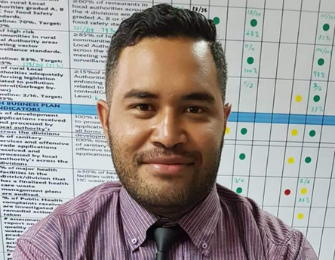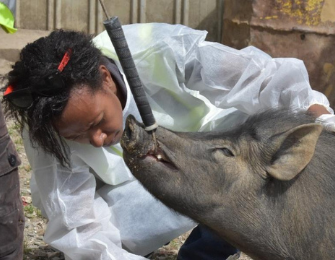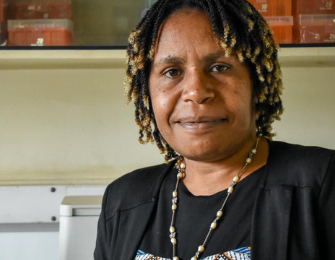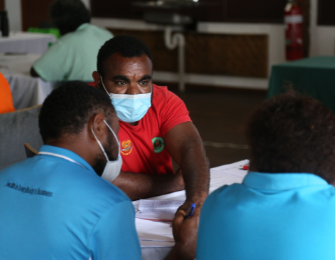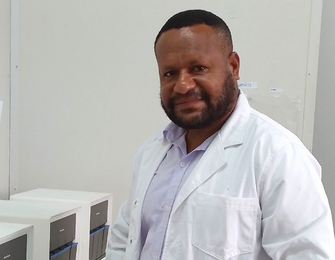
How did your pathway to working on the ACTUP-PNG project evolve?
I obtained a Diploma of Health Sciences – Health Extension Officer from the Divine Word University and a Diploma of Public Health from the University of Papua New Guinea. I have been working in the field of HIV for over 12 years. In 2017, I joined the Papua New Guinea Institute of Medical Research as a senior clinician for the integrated bio-behavioural survey conducted with female sex workers, men who have sex with men, and transgender women. Most recently, my role as Project Coordinator has been to support a new and enhanced outreach program where I was collaborating on the design of and training for a community-based HIV, syphilis, hepatitis B and TB screening project to be led by key populations. Since joining the ACTUP-PNG team in 2021, I have worked as a clinician, performed HIV viral load and early infant diagnosis testing, and have coordinated work activity between our two project sites.
How have your professional skills developed since joining the work of ACTUP?
I have been trained to conduct point-of-care HIV viral load and early infant diagnosis testing using the GeneXpert machine. This has involved sample preparation through to basic operation of the machine, as well as maintenance and quality assurance. I have also learnt how to prepare, store, and transport samples for HIV drug resistance testing and am now looking forward to learning how to conduct the testing when training commences in Australia at the World Health Organization HIV drug resistance laboratory at St Vincent’s Hospital, Sydney. I have also learnt how to record, manage, and do basic data analysis for routine reports and to understand the HIV situation in the locality. These are very important areas of learning, helping me better understand all aspects of HIV care, treatment and prevention of HIV drug resistance. The skills I have acquired through ACTUP-PNG have enhanced my professional capacities significantly, expanded my career options and fostered new ambitions in HIV leadership in Papua New Guinea and the Pacific region.
What do you feel are some of the challenges for you in working with ACTUP?
Point-of-care testing is important for returning the results to clinicians and then patients in a timely manner. We have been successful in delivering same-day results to clinicians, however it has been a challenge to do so for patients, particularly in Mount Hagen in the Western Highlands. While the results are available on the same day, some patients do not wait to receive them, citing reasons such as poor weather, fear of COVID-19 transmission, and the distance people travel between home and the clinic. The project is working to address these issues with patients and the clinics we work with.
What do you enjoy most about your work in ACTUP?
Papua New Guinea has not yet achieved all three of the UNAIDS testing, treatment and viral suppression targets. These targets can only be achieved through partnership approaches and embarking on innovative, targeted, and guided programs that are workable in our country’s context. ACTUP-PNG, which has been generously funded and supported by the Australian Government through the Indo-Pacific Centre for Health Security, is a model of innovation for point-of-care testing to help propel the country’s effort towards achieving its HIV targets of viral load coverage and suppression. My work with the project has brought about great learning opportunities in the field of research and laboratory testing activities using well-regarded, advanced testing equipment such as the GeneXpert machine and has provided exposure to local and international standards of practice. ACTUP staff are closely mentored and encouraged in a supportive environment to venture into new HIV learning fields. Helping people living with HIV by providing viral load tests and disseminating results (many have never had such a test before) and seeing the joy and happiness that draws from them when they see that their treatment is working is heart lifting. Most of all, our contributing effort to prevent HIV transmission, curtail drug resistance and alleviate impending and related health threats through such important work is inspiring and rewarding.
Why are you passionate about contributing to understanding HIV drug resistance in PNG?
HIV drug resistance is a health security threat and remains a formidable foe if not monitored closely and vigilantly. To ensure the necessary causative factors are curtailed requires an in-depth understanding of the behaviours of the virus and contributing factors to its thriving. Viral load monitoring is an effective way of tracking treatment adherence issues, treatment efficacies and early detection of drug resistance. Surveillance of drug resistance contributes to awareness of threats to health security and will provide evidence to address those threats in our country.
How does your work impact HIV positive people’s lives in PNG?
I am passionate in supporting any interventions and programs which are employed to support people living with HIV and ensure HIV drug resistance is addressed and managed effectively. Contributing to ACTUP and ensuring HIV viral load tests are readily available and conducted, and having results available to be immediately disseminated for clinical decisions and patient management, helps improve treatment outcomes, thereby saving lives and ensuring longevity. From a community perspective, different populations have differing risk factors and needs when it comes to HIV. We recognise these differences and tailor the way we work with our key populations to ensure they are best served. ACTUP services also addresses prevention of parent-to-child HIV transmission. Women and children are a particular at-risk group, so it is important that we ensure they are able to benefit from the HIV services. Our expanding work with children and infants with HIV is innovative, and I am looking forward to being part of the team that introduces point-of-care viral load testing for our smallest children living with HIV, from 6 weeks to 10 years. From a broader perspective, the outcome of our work is already being seen in testing practices and this will flow onto policy decisions at the national level so that programs are improved, tailored, and provided for the greater benefit of all, particularly those not living in the capital, Port Moresby.
What would you say, or what advice would you give to others working in health and security?
Health security is essential to life, and it is determined by how much effort is put in by any given community, society and individual to ensure health security is sustained. The detrimental effect of complacency and ignorance regarding health security issues can be fatal and it can become very costly having to address those issues when they go uncontrolled. Health security calls for a concerted and united effort, vigilance, and enthusiasm to pursue innovative and effective approaches to curb threats and solve any predisposing factors that pose risks to the society. This starts with every individual and those on the front line of work in HIV to have the conviction and focus to serve with determination to help ensure a better today and tomorrow for everyone.

